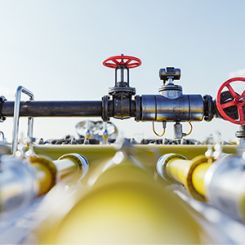
A major energy producer decided to add new infrastructure to one of its existing offshore oil and gas fields in the Gulf of Mexico. The company hired an engineering firm to support the design and construction of the expansion. The new deep-water platform is located in about 3,000 feet of water, is specially designed to safely withstand hurricane force conditions and adds an increased capacity of 100,000 barrels per day.
The engineering firm worked with a provider of fluid handling products to design the fire water pumps for this platform. Fire water pumps are at the heart of a firefighting system on a platform. Reliable operation under extreme conditions is a key requirement. The deep-water platform required 200-foot-long vertical lift pumps that could pull up and push out fire-extinguishing salt water at a fast rate of 6,800 gallons per minute. The pumps would not be running continuously but would be routinely tested and endure frequent starts/stops.
A design and systems analyst for the provider designed custom pumps for this specific application. The 1,000-horsepower (hp), diesel-driven pumps were fabricated from super duplex materials. Super duplex is a high-performance stainless steel with a composition of approximately 25% chromium, 7% nickel and 4% molybdenum —a combination which results in a more corrosion-resistant material that can withstand harsh fluids such as saltwater.
Sharing its pump solution with the engineering firm, the provider also invited engineers from a pump bearing manufacturer to present technical information on bearing materials for this seawater application. During a meeting, a case was made to graphite-metal alloy bearings instead of plain metal or rubber bearings.
Graphite-metal alloy bearings are self-lubricating, non-galling and corrosion resistant. Another benefit of these bearings is the potential for lower vibration due to tighter running clearances. These bearings are uniform and use graphite that is impregnated with different metals. Pump applications will often use tin Babbitt or nickel impregnation, depending on the temperature and pump service.
As the engineering firm weighed the choice between metal, rubber bearings and graphite-metal alloy bearings, three major factors were discussed and considered.

Run Dry Conditions
Since the pumps are on standby for extended periods of time, the upper bearings are usually dry. During startup, it takes a considerable amount of time for the seawater to travel up the 175-foot shaft to lubricate the bearings. Thus, the bearings experience extended “run dry” conditions—every time the pump starts, the bearings have to operate without sufficient lubrication. Traditional bearing materials require constant lubrication or they can wear excessively, leading to failure and possibly seizing the pump. This can compromise the firefighting system, a dangerous situation.
Graphite-metal alloy bearings can handle these conditions, due to their non-galling and self-lubricating qualities. The graphite structure acts as a deck of cards, providing layer upon layer of lubrication, while the metal adds strength and wear resistance. This allows pumps to continue operating during system upsets or extended periods of running dry, without seizing.
Need for Corrosion Resistance
Corrosion is a serious issue for stainless steel seawater pumps. The provider addressed this challenge with a super duplex design, so it made sense to include a bearing material that was similarly corrosion resistant.
Nickel-grade, graphite-metal alloy bearings are a good match since the nickel-grade has years of proven success in seawater pump applications. The nickel-grade bearings can also operate in extreme temperatures ranging from -400 F (240 C) to 750 F (400 C).
Reliability for Safety Service
Everybody on a deep-water platform needs to be assured of the reliability of the safety systems. The fire water pumps need to operate reliably, every time they are needed. These vertical seawater lift pumps are located on the main deck, suspended over the ocean, and their long column pipes extend down into the water. They are a critical piece of the firefighting system and cannot fail.

